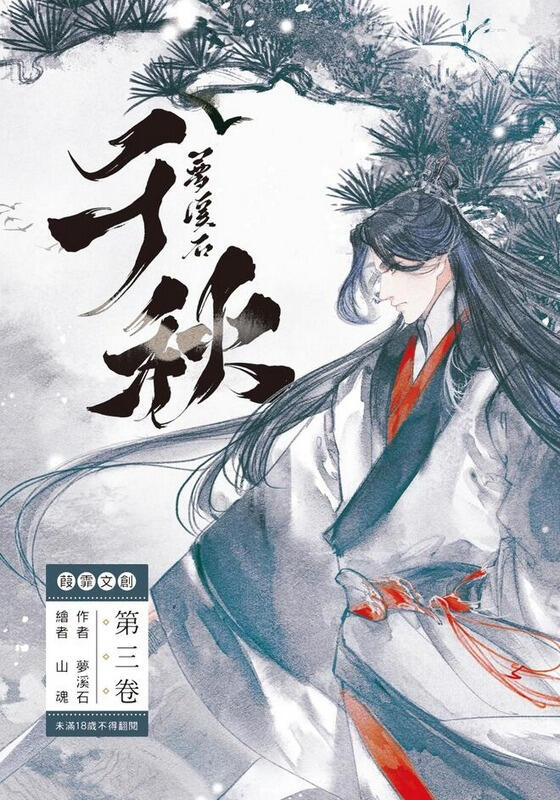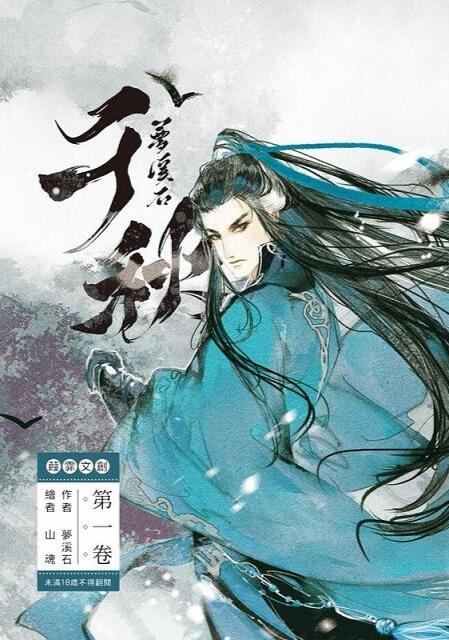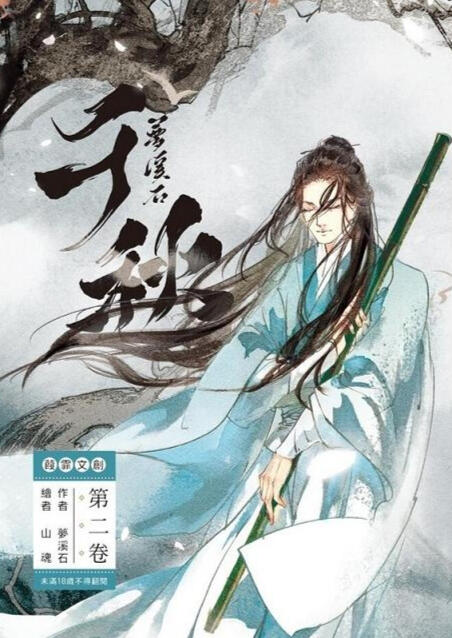千秋之後,誰能不朽?
thousand autumns
「天地不朽」
"heaven and earth will look on for time immemorial."
who are you?
i'm nhi! i'm a nonbinary viet kieu living on occupied native land. i love language and translation and channel that love into the works that i translate, first and foremost is meng xishi's qianqiu.@yanwushi is my translation account! currently focused on qianqiu. sometimes i'll post about language, and very occasionally i'll rt something about my other interests (horror, cinema, some manga). i only follow back good friends + some accts relevant to my interests atm!where did you study chinese?
at university + ICLP! (台大國際華語研究所!) if you're ICLP alumni PLEASE reach out lets chat im so nostalgic!are you chinese?
nope! i have some chinese ancestry from my grandparents but that's it.you've translated this part wrong!
pls reach out to me and let me know! i am always willing to improve and i have made and will certainly continue to make mistakes here and there!i really dislike you and your views/the danmei fanbase does not need people like you/just stop interacting with danmei/we don't need translators like you/etc
then please block me!i keep my fandom views completely separate from my translation twitter and i never engage with discourse there.if you want to fight, join the discord server and send me a private message. i will not engage with you on my translation account and inconvenience my followers.
"Yan Wushi had walked a path full of blood and corpses.He did not believe in the good nature of humanity. Even more so, he did not believe that there could be someone with great kindness and sense of justice, who would be so considerate of others without asking anything in return.One day, Shen Qiao, who was the sect leader of Mount Xuandu, the number one Daoist sect under the heavens, was challenged to a duel but somehow fell off the cliff.Yan Wushi happened to pass by down there.Seeing Shen Qiao who was seriously injured to the point of dying, he suddenly came up with a perfect idea…After thousands of autumns, who could stay eternal?"
What is Qian Qiu?
Qian Qiu is a wuxia novel with danmei characteristics, written by Meng Xishi. Though technically it is danmei, romance is second to worldbuilding and characterization in this novel.
The story revolves around Shen Qiao, the kind and gentle head of the renowned Xuandu Mountain sect, who is severely wounded from a battle in the first chapter, and meets Yan Wushi, the head of a demonic sect, who initially takes him in with the desire to turn him evil.
Afterwards, many events take place that test the depth of Shen Qiao's kindness and the cruelty with which Yan Wushi approaches the world.
It is set against the backdrop of the Northern Southern dynasties, which I have summarized to a small extent here. The imperial court and Jianghu co-exist with one another and readers will find that their worlds often mix.


Trigger Warnings
Non-consensual kissing: Yan Wushi frequently kisses Shen Qiao completely without consent. Actually every time they kiss, I am pretty certain it is totally without Shen Qiao’s consent.
Sexual abuse/rape mentions: There is no explicit sexual abuse in the work and it is not a main plot point.
However, there are references to such events. Most of them revolve around a character named Sang Jingxing, one of the main antagonists whose character is mostly defined by the sexual abuse of his disciples and his desire to do the same to Shen Qiao. However, Sang Jingxing is a minor character. He also does not get the chance to act on his desire to sexually abuse Shen Qiao and does die, though rather late into the work.
There is additionally another character named Mutipo who has similar characteristics, and is introduced much earlier on as a minor role, though he comes to his demise rather quickly.
I'm a little intimidated. Where should I start?
The first three episodes of the audio drama covers the first fifteen chapters of the novel. As such, I do recommend trying the audio drama before the novel so that the information dumping in the first few chapters doesn't overwhelm you (and if it does, I have a list of historical players + sects + characters as well as a summary to keep you on the right track).
If you want to know which chapters cover which episodes, see below.
EP1 = CH1-5
EP2 = CH6-10
EP3 = CH11-15
EP4 = CH16-20
EP5 = CH21-24
EP6 = CH25-30
EP7 = CH31-34
EP8 = CH35-38
EP9 = CH39-41
EP10 = CH42-44
EP11 = CH45-47
EP12 = CH48-50
EP13 = CH51-53
EP14 = CH54-58
EP15 = CH59-61

Downloads
Currently all three of the free episodes are available to the public. I have subbed them and uploaded the episodes to MEGA.Because I am not comfortable with having the paid episodes open to the public, I must ask that you join the audio drama discord server and request permission to access it. If you are an iOS user, I must ask that you purchase the drama before I give you access. If you aren't, you can DM me in the server and I'll give you access.The server is SFW, and open to everyone over 15. There are no discussion channels. It is a place that primarily gives users updates on the translations, and asks for help wrt troubleshooting files, opening a MissEvan account, etc.
Episodes 1-10: Translated, SubbedEpisodes 11: 100% translated + subbed
Episodes 12: 100% translated, 100% subbed
Episodes 13: 100% translated, 100% subbed
Episodes 14: 100% translated, 100% subbed
Episodes 15: 100% translated, 100% subbed
Translation Schedule
12/3/2019
all 15 episodes have been completely subbed! now what's left are the extras here and there, which i will upload to twitter.
i will see you guys again in season 2!12/1/2019
only one episode left to go guys ; u ; scary...but exciting!
11/25/2019
things have been slow! many apologies. we're in the final stretch now yall! eps 13, 14, 15 will be completed shortly. believe in me! <3
11/9/2019
I have translated through Episode 10 at the moment. Due to some IRL happenings as well as the increased length of the episodes, Episodes 11-15 will be released more slowly than the first 10. I am hoping to have them completed in the next two weeks.
An Unhelpful Summary
To start, we just have to keep in mind that the Northern and Southern Dynasties was one of the most turbulent times in Chinese history. Just take a look at Northern Zhou, who goes through about three Yuwen’s in like, the span of a few decades lol…
The Four Main Players
Anyway. There are three main states: Northern Zhou, Northern Qi, and Southern Chen. They are of Zhongyuan, the Central Plains/Chinese territory, and they’re all fighting to try to unite the other under their name.Northern Zhou is being ruled by the Yuwen clan. Ever since Yuwen Yong took over, the territory has become very stable.He is both a relentless and very wise ruler, who has compromised with Tujue but also wants to subjugate Northern Qi. Important to Qian Qiu, however, is the fact that he has subjugated Daoist and Buddhist influence, which leads Daoist and Buddhist sects to look elsewhere (Qi, Tujue, Chen) to establish power.Northern Qi isn’t great outside of the city, and many people are suffering (there are lots of refugees, as you’ll see), since the Ruler of Qi is a useless bastard.On the other hand, Southern Chen is what remains of the Han Chinese-ruled Jin Dynasty; its ruler is of Han descent, and the area is thriving, similar to Zhou.All three of these territories, however, share a common enemy, which is Tujue, a territory to the north that his A) fucking HUGE and B) home to the Göktürks. Tujue is incredibly strong, such that even Yuwen Yong had to marry the Princess Ashina of Tujue as a show of power to Tujue. Some sects in jianghu also begin to ally with Tujue.
What does Jianghu have to do with this?
So under these circumstances, we have Daoist, Buddhist, Confucian, and Demonic sects associating with the above four territories in order to further their own means.An example: Yan Wushi and Yuan Xiuxiu are heads of the most influential demonic sects—Huanyue and Hehuan. They both want to unite the Demonic sects under their own names. As such, they serve two of the most influential territories: Zhou and Qi. Any changes in the relationship between Zhou and Qi will have an impact on their sects as well.Our main characters, Shen Qiao and Yan Wushi, are associated in some capacity with Zhou.Shen Qiao, at the beginning, does not pledge his allegiance to anyone, will eventually come to indirectly assist Yuwen Yong, and later, directly assist Puliuru Jian/Yang Jian, who succeeds the Yuwen clan and establishes the Sui Dynasty.Yan Wushi is the Imperial Adviser (i think this is also called Crown Prince Adviser) to Yuwen Yong. At the same time he’s an asshole, he’s also made further unpopular due to helping Yuwen Yong extinguish the influence of other sects (to his own benefit). It places him in a precarious situation.
In Conclusion?
Qian Qiu (and later, Wushuang) are made interesting in that characters of jianghu are strongly associated with the politics of the time. If we keep this in mind, as well as the general idea of the territories involved and their motivations, the motivations of the sects and many characters become clearer.
A Note from the Author
Below is a translated note from Meng Xishi at the end of Chapter 52, where she explains to us the historical background of Qian Qiu, and comments once more on the relationships between Jianghu and the Imperial Court.
There were spoilers, but I have ommitted them.
Actually, this work does not have much to do with actual history. If you don’t know of it, then it will not influence your reading. However, sometimes there are questions, so I’ll address them anyway.We all know that this period of time was one was one of the most tumultuous and chaotic in Chinese history. Though many people know about The Uprising of the Five Barbarians, but what of the specific concept?What was united under the Jin Dynasty was so for only a short period of time. The Western Jin dynasty fell shortly after being formed; afterwards, when outsider clans entered Zhongyuan*, the Jin Dynasty had no choice but to move to the Southeastern regions. Such was the Jin Dynasty.At the same time that the Eastern Jin dynasty existed, the northern regions were in chaos without a leader. When outside clans entered, everything became even more confused. Some regimes were innately cruel. And under other regimes, many people had to kill each other simply to survive. In short, at this time, common people were not treated in an even remotely humane manner.Take, for example, the Zhao emperor of that time, Shi Hu, who had searched the land for beautiful Buddhist nuns. Upon finding them, he took them and boiled them with beef and goats not only for himself to eat, but for his closest ministers, simply because he wanted to see if they could tell whether or not they could tell the difference between human meat and animal meat in a dish. This Shi Hu was of the Jie clan, and the Jie clan was one of the five outsider clans of The Uprising of the Five Barbarians.As far as the historical background of Qian Qiu, it is focused on the final years of this era as it leads into the Sui Dynasty. One could say that this period is like wandering into a bright light in a sea of darkness—yet it is still dark, all the same.At this point in time, the north had been governed over for several hundred years. Common people could not differentiate between Han people and outsider clans, for it was no longer as obvious. Similar to how the Northern ruler Yuwen Yong was of the Xianbei clan, though by then, most Xianbei people had already conformed to Han culture. Additionally, at that time, the Northern Zhou Dynasty was incredibly strong. It was a good opportunity for unification of the country, so his subordinates were also quite talented.However, the more powerful group was the Tujue people. They were so powerful that Yuwen Yong had no choice but to marry the princess of Tujue. The country of Qi also had to play on Tujue’s good side and kiss their asses quite a bit.Tujue had not yet conformed to Han Culture; they always remained a nomadic people. If they had a grudge with someone, then they would simply pillage them and move southwards. This was the nature of most nomadic peoples.The Chen dynasty’s Chen Suo could also be considered a promising ruler, because the south was still unified by the continued rule of the Jin Dynasty. As a result, many people believed that, to restore the Han Dynasty, they must look southwards. Though Yuwen Yong was powerful, he was, in the end, still of a different race.Every character involved has to consider their own interests, and their own positions. Some are worried about their own sects, others are worried about the future of their country, and others are there to settle their own personal debts with old man Yan, perhaps because they’re quite tired of seeing him around. It isn’t simple enough to describe people as strictly “good” or “bad”. Take Shen Qiao as an example. Though he is gentle and kind, but no matter how good he is, he still attracts criticism from everyone. Some people think he’s too good, and that he should not be so soft-hearted, that he should not save so-and-so. As such, it is quite clear that there really isn’t a perfect person on this world.